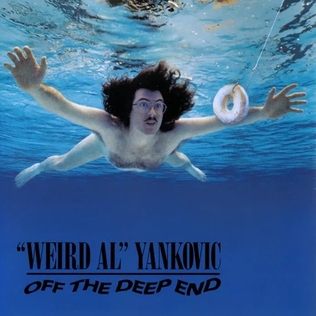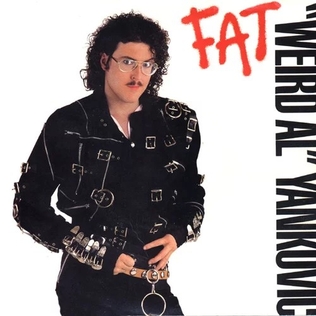The Grammy Award for Best Music Film is an accolade presented at the Grammy Awards, a ceremony that was established in 1958 and originally named the Gramophone Awards, to performers, directors, and producers of quality videos or musical programs.
The Grammy Award for Best Music Video is an accolade presented at the Grammy Awards, a ceremony that was established in 1958 and originally called the Gramophone Awards, to performers, directors, and producers of quality short form music videos. Honors in several categories are presented at the ceremony annually by the National Academy of Recording Arts and Sciences of the United States to "honor artistic achievement, technical proficiency and overall excellence in the recording industry, without regard to album sales or chart position".

Poodle Hat is the eleventh studio album by "Weird Al" Yankovic, released on May 20, 2003. It was the fifth studio album self-produced by Yankovic. The musical styles on the album are built around parodies and pastiches of pop of the early-2000s. The album's lead single, "Couch Potato", is a parody of "Lose Yourself" by Eminem. The single failed to chart, although the album's song "eBay" eventually peaked at 15 on the Bubbling Under Hot 100 Singles in 2007.

Alapalooza is the eighth studio album by "Weird Al" Yankovic, released in 1993. By the completion of his previous album, Off the Deep End, Yankovic had already written all of the original songs that he planned to use on his next release. This new album, which would eventually be titled Alapalooza in reference to the music festival Lollapalooza, consisted of seven original songs and five parodies. It produced three parody singles: "Jurassic Park", "Bedrock Anthem", and "Achy Breaky Song". "Jurassic Park" was a top five hit on the Canadian magazine The Record's single chart.

Off the Deep End is the seventh studio album by "Weird Al" Yankovic, released in 1992. This album was the first album self-produced by Yankovic, after six albums with Rick Derringer. Recorded between June 1990 and January 1992, the album was a follow-up to the unsuccessful soundtrack to Yankovic's 1989 film UHF. Off the Deep End and its lead single "Smells Like Nirvana" helped to revitalize Yankovic's career after a lull following his last hit single, "Fat", in 1988.

UHF – Original Motion Picture Soundtrack and Other Stuff is the sixth studio album by "Weird Al" Yankovic, released on July 18, 1989. The album is the final of Yankovic's to be produced by former McCoys guitarist Rick Derringer. Recorded between December 1988 and May 1989, the album served as the official soundtrack to the 1989 film of the same name, although the original score by John Du Prez is omitted. The album's lead single was the titular "UHF", although it was not a hit and did not chart.

Even Worse is the fifth studio album by "Weird Al" Yankovic, released on April 12, 1988. The album was produced by former The McCoys guitarist Rick Derringer. Recorded between November 1987 and February 1988, this album helped to revitalize Yankovic's career after the critical and commercial failure of his previous album Polka Party! (1986).

"Weird Al" Yankovic in 3-D is the second studio album by American singer-songwriter "Weird Al" Yankovic, released on February 28, 1984, by Rock 'n Roll Records. The album was one of many produced by former McCoys guitarist Rick Derringer. Recorded between October and December 1983, the album was Yankovic's follow-up to his modestly successful debut LP, "Weird Al" Yankovic.

"Eat It" is a 1984 song by American comedy music artist "Weird Al" Yankovic. It is a parody of Michael Jackson's 1983 single "Beat It", with the contents changed to be about an exasperated parent attempting to get their picky child to eat anything at all, much less to eat properly. The track was both a commercial and critical success, earning Yankovic a Grammy Award. It peaked at number twelve in the United States, making it his first top 40 hit in that country, and reached number one in Australia.
The Grammy Award for Video of the Year was an honor presented to recording artists at the 24th Grammy Awards in 1982 and the 25th Grammy Awards in 1983 for music videos. The Grammy Awards, an annual ceremony that was established in 1958 and originally called the Gramophone Awards, are presented by the National Academy of Recording Arts and Sciences of the United States to "honor artistic achievement, technical proficiency and overall excellence in the recording industry, without regard to album sales or chart position".
The Grammy Award for Best Performance Music Video was an honor presented to recording artists at the 30th Grammy Awards in 1988 and the 31st Grammy Awards in 1989 for quality performance music videos. The Grammy Awards, an annual ceremony that was established in 1958 and originally called the Gramophone Awards, are presented by the National Academy of Recording Arts and Sciences of the United States to "honor artistic achievement, technical proficiency and overall excellence in the recording industry, without regard to album sales or chart position".
The Grammy Award for Best Female Rap Solo Performance was an honor presented to female recording artists at the 45th Grammy Awards in 2003 and the 46th Grammy Awards in 2004 for quality rap solo performances. The Grammy Awards, an annual ceremony that was established in 1958 and originally called the Gramophone Awards, are presented by the National Academy of Recording Arts and Sciences of the United States to "honor artistic achievement, technical proficiency and overall excellence in the recording industry, without regard to album sales or chart position".

"Fat" is a song by "Weird Al" Yankovic. It is a parody of "Bad" by Michael Jackson and is Yankovic's second parody of a Jackson song, the first being "Eat It", a parody of Jackson's "Beat It". "Fat" is the first song on Yankovic's Even Worse album.

"Smells Like Nirvana" is a song parody written and performed by American musician "Weird Al" Yankovic. A parody of Nirvana's song "Smells Like Teen Spirit", it was released as the lead single from Yankovic's Off the Deep End album in April 1992. "Smells Like Nirvana" was written during a three-year career low for Yankovic after the financial failure of his film UHF, but captured the quickly-rising popularity of grunge and Nirvana's success. The song was written to ridicule the fact that many people could hardly understand Nirvana singer Kurt Cobain's lyrics in the original song. After being unable to contact Nirvana conventionally, Yankovic called Cobain while the band was on the set of Saturday Night Live, where Cobain quickly gave permission to record the parody.

This Note's for You is the 18th studio album by Canadian musician Neil Young, released April 11, 1988 on Reprise. The album marked Young's return to the recently reactivated Reprise Records after a rocky tenure with Geffen Records.

"Weird Al" Yankovic's Greatest Hits is a compilation album of parody and original songs by "Weird Al" Yankovic, featuring his best known songs from his first five studio albums, all of which were released in the 1980s. "Weird Al" Yankovic's Greatest Hits was met with mostly positive reviews from critics, with Heather Phrase of AllMusic noting that it provided a good overview of the early part of Yankovic's career. Despite this, the album failed to chart upon release, and ranks as one of Yankovic's lowest-selling records.

"Jurassic Park" is a parody of Richard Harris's version of Jimmy Webb's song "MacArthur Park", written and performed by "Weird Al" Yankovic; it was released both as a single and as part of Yankovic's Alapalooza album in October 1993. "Jurassic Park" was penned by Yankovic after he remembered the enjoyment he had when he combined a classic rock track with a recent movie theme with his 1985 song "Yoda". Yankovic decided to combine the plot of the recent movie Jurassic Park—a film about a park on a fictional island where geneticists have succeeded in cloning dinosaurs—with the classic Richard Harris track "MacArthur Park".

The discography of American singer, songwriter, musician, record producer, actor and parodist "Weird Al" Yankovic consists of fourteen studio albums, two soundtrack albums, nine compilation albums, eleven video albums, two extended plays, two box sets, forty-six singles and fifty-four music videos. Since the debut of his first comedy song in 1976, he has sold more than 12 million albums—more than any other comedy act in history—recorded more than 150 parody and original songs, and performed more than 1,000 live shows. His works have earned him five Grammy Awards among sixteen nominations, along with several gold and platinum record certifications in the United States. Yankovic's first single, "My Bologna", was released in 1979, and he made his chart debut two years later with his second single, "Another One Rides the Bus", which peaked at number four on the Billboard Bubbling Under Hot 100 Singles chart. His self-titled debut studio album was released on Scotti Brothers Records on May 3, 1983, peaking at number 16 on the US Billboard 200 and being certified gold by the Recording Industry Association of America (RIAA). "Ricky", the album's third single, became his first single to chart on the US Billboard Hot 100, peaking at number 64.

Alfred Matthew "Weird Al" Yankovic is an American musician, comedian, and actor. He is best known for writing and performing comedy songs that often parody specific songs by contemporary musicians. He also performs original songs that are style pastiches of the work of other acts, as well as polka medleys of several popular songs, most of which feature his trademark accordion.

Mandatory Fun is the fourteenth and most recent studio album by American musician "Weird Al" Yankovic. The self-produced album was released by RCA Records in the United States on July 15, 2014. Yankovic had previously released Alpocalypse in 2011 and was touring in support of it when he first spoke of his next record. When he began to work on Mandatory Fun, Yankovic found himself listening to older acts, many of which he stylistically spoofed on the album.















